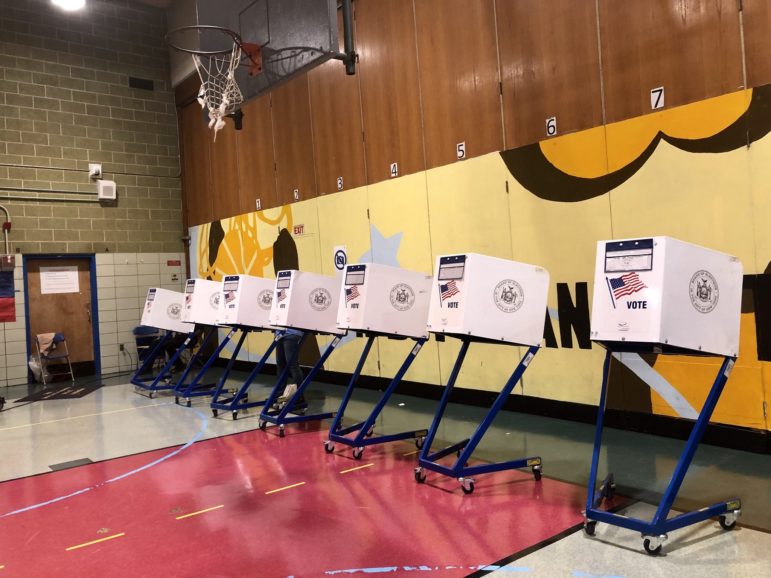
CIty Limits/Jeanmarie Evellt
A polling site in Astoria, Queens, in 2019.As we enter the final weeks of budget negotiations in Albany, we are once again headed towards a fight over big money’s role in our state’s politics. The governor’s budget proposal falls woefully short of addressing the accelerating economic inequality in our state.
While the fight over healthcare, education, and housing funding has rightfully taken center stage, it’s also important to note that the governor did not include any funding for a reform fundamental to all of these issues: the state’s new public financing program (which, oddly, he had helped establish just last year). That program, despite room for improvement, is New York’s single best hope for reversing the flow of power in Albany away from the wealthiest and towards the people. The Assembly and the Senate must not let this opportunity go to waste. Our lawmakers must step up and insist that the final budget provide funding for this vital reform.
Advocates across the state have rallied around public financing as a critical tool for reducing the influence of big money in our elections. The New York State program is designed to empower small donors to political campaigns by matching their donations with public money, while making it possible for people who aren’t rich and don’t have connections to the wealthiest to run competitive campaigns for office. We need to lift up the voices of the people who are most impacted by Albany’s policies to tackle New York’s economic inequality head on.
Many of our state’s activists and organizers are pushing for Budget Justice, challenging the legislature to deliver a vision for our state where all can prosper. Budget Justice means taxing the vast, under-assessed extreme wealth in our state to raise an estimated $35+ billion, and investing it to make New York a better, fairer, safer home for us all.
Recent polling has shown that 9 out of 10 New Yorkers support these policies. And many progressive champions in the Assembly and the Senate have come out in support of a host of new revenue opportunities to help fully fund our public schools, solve our homelessness crisis, expand and improve healthcare coverage, and much more.
But the budget process in Albany has long been criticized for making good policies disappear or waste away from a purported lack of funding. The governor continues to push back on raising revenue to address these challenges in favor of an austerity approach that disproportionately burdens working families and the poor across the state.
Our legislators must stand strong this time and deliver on their promises, with the nominal funding needed for New York’s new public financing program at the top of the list.
Much has been said about the result of the public financing commission’s work: an imperfect policy with the added baggage of a misguided attack on our state’s minor parties. What has been lost in the discussion is the program’s substance: a set of changes to the way our elections are funded that will amplify the voices of New Yorkers who are now marginalized by state politics.
From reducing campaign contribution limits, to a progressive public-matching system designed to account for diverse income levels across the state’s districts, New York is poised to take the first step towards uplifting the voices of women; of people of color; of the working and middle classes; and of any and all under-represented New Yorkers in the political process.
By law, our new public financing program must be up and running by November 2022 to support the 2024 legislative and 2026 statewide elections. Much careful thought went into mapping out the proper funding and resources to ensure this timeline was achievable.
 CityViews are readers’ opinions, not those of City Limits. Add your voice today!
CityViews are readers’ opinions, not those of City Limits. Add your voice today!
For the state budget now under negotiation, the most critical expenditures for the public financing program are for technology development and staff. The $2.7 million that the State Board of Elections has requested for the program for this upcoming year is minimal compared to our state’s $178 billion budget.
Very soon, the Assembly and the Senate will be introducing their one-house budgets. Activists who showed up in droves before once again need to make their voices heard. The fight for a stronger, more representative democracy was always going to be a marathon, not a sprint. But we cannot allow our elected leaders to push back the finish line.
The governor, your assemblymember, and your state senator need to hear from you. They need to fully fund the implementation of our new public financing program. And they must start now.
Ricky Silver is Co-Lead Organizer of Empire State Indivisible. Tara Herman is a member of NYCD16-Indivisible Steering Committee.









One thought on “Opinion: Funding for Public Financing is Essential to Fight for Equality in NYS”
Yes!!! I support budget justice… it is only fair.